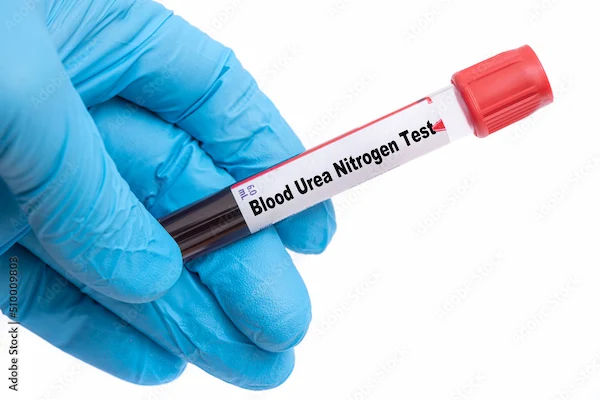How To Reduce Blood Urea?
Concerned about high blood urea levels? Learn about potential causes and lifestyle adjustments that might help.

Written by Dr.Sonia Bhatt
Last updated on 3rd Jul, 2025

Introduction
High blood urea levels can be concerning, but the good news is that with the right lifestyle changes and medical guidance, you can manage it effectively. If you or a loved one has been diagnosed with elevated urea levels, this article will help you understand what it means, why it happens, and how you can take steps to bring it back to a healthy range.
What Is Blood Urea?
Urea is a waste product formed in the liver when your body breaks down proteins from food. Your kidneys filter urea from the blood and remove it through urine. When your kidneys aren’t functioning optimally, urea can build up in the bloodstream, leading to high blood urea levels.
A blood urea nitrogen (BUN) test is commonly used to measure urea levels. Normal levels typically range between 7 to 20 mg/dL, but this can vary slightly depending on the lab. Higher levels may indicate kidney problems, dehydration, or other health issues.
Symptoms of High Blood Urea
Not everyone with elevated urea levels experiences symptoms, but some common signs include:
Fatigue and weakness
Loss of appetite
Nausea or vomiting
Swelling in legs or feet (edema)
Frequent urination or reduced urine output
Confusion or difficulty concentrating (in severe cases)
If you notice these symptoms, consult a doctor for proper evaluation.
Causes of High Blood Urea
Several factors can contribute to increased urea levels:
Dehydration: Insufficient fluid intake reduces kidney function, leading to an accumulation of urea in the blood.
High-Protein Diet: Consuming excessive amounts of protein results in increased urea production as a byproduct of protein metabolism.
Kidney Disease: Impaired kidney function hinders the effective filtration and removal of urea from the bloodstream.
Urinary Tract Obstruction: Blockages in the urinary tract, such as kidney stones, can prevent the excretion of urea.
Certain Medications: Some medications, including diuretics and certain antibiotics, can influence blood urea levels.
Severe Infections or Burns: These conditions can increase protein breakdown in the body, leading to elevated urea levels.
How to Reduce Blood Urea Naturally
Tips on how to reduce blood urea:
Stay Hydrated: Drink 8-10 glasses of water daily (or as advised by your doctor) to help your kidneys efficiently flush out urea.
Adjust Your Protein Intake: Consume protein in moderation, and consult a dietitian if you have kidney concerns to determine your optimal intake.
Eat Kidney-Friendly Foods: Focus on fruits, vegetables (like apples, cabbage, cauliflower), whole grains (brown rice, oats, quinoa), and healthy fats (avocado, olive oil, nuts) to support kidney function.
Limit Salt & Processed Foods: Reduce intake of high-sodium items like packaged snacks and canned foods to minimize strain on the kidneys.
Exercise Regularly: Engage in moderate physical activity such as walking, yoga, or swimming to improve circulation and support kidney health.
Manage Underlying Conditions: Effectively manage conditions like diabetes, high blood pressure, and kidney disease by following your doctor's recommendations.
Avoid Alcohol & Smoking: Refrain from alcohol and smoking, as both can negatively impact kidney function and elevate urea levels.
Consult Top Endocrinologist for Natural Treatment
When to See a Doctor
If lifestyle changes don’t lower your urea levels, or if you experience severe symptoms like:
Persistent nausea/vomiting
Extreme fatigue
Swelling in limbs
Difficulty urinating
How Apollo 24|7 Can Help
If you're concerned about your blood urea levels, Apollo 24|7 offers:
Easy blood tests to check your urea and kidney function.
Expert consultations with nephrologists and dietitians.
Personalized health plans to manage kidney health.
You can book a test or consult a doctor from the comfort of your home through the Apollo 24|7 app or website.
Conclusion
High blood urea is manageable with the right diet, hydration, and medical care. Small changes in your daily routine can make a big difference in keeping your kidneys healthy. If you suspect elevated urea levels, don’t hesitate to get tested and seek professional advice. Take care of your kidneys—they work hard to keep you healthy! Would you like to schedule a kidney function test or speak to a specialist? Visit Apollo24|7 today for quick and reliable healthcare support.
Consult Top Endocrinologist
Consult Top Endocrinologist for Natural Treatment

Dr. Gayatri S
Endocrinologist
4 Years • Suggested Qualifictaion- MBBS, MD (Internal Medicine), DM (ENDOCRINOLOGY)
Nellore
Narayana hospital, Nellore

Dr. Nithin Reddy Modhugu
Endocrinologist
6 Years • MBBS, MD (General Medicine), DNB (Endocrinology)
Hyderabad
Dr. Nithin's Endocrine Clinic, Hyderabad
(100+ Patients)

Dr. Shiva Madan
Endocrinologist
10 Years • MBBS , MD (General medicine) , DM (Endocrinology)
Bikaner
Sushma diabetes and Endocrine center, Bikaner

Dr. Venkata Rakesh Chintala
Endocrinologist
8 Years • MBBS,MD( GEN MEDICINE), DM ( ENDOCRINOLOGY)
Krishna district
Sanjeevani Hospital, Krishna district

Dr. Arunava Ghosh
General Physician/ Internal Medicine Specialist
9 Years • MBBS,MD(GENL.MED.),DM(ENDOCRINOLOGY)
Kolkata
VDC Clinic, Kolkata
Consult Top Endocrinologist

Dr. Gayatri S
Endocrinologist
4 Years • Suggested Qualifictaion- MBBS, MD (Internal Medicine), DM (ENDOCRINOLOGY)
Nellore
Narayana hospital, Nellore

Dr. Nithin Reddy Modhugu
Endocrinologist
6 Years • MBBS, MD (General Medicine), DNB (Endocrinology)
Hyderabad
Dr. Nithin's Endocrine Clinic, Hyderabad
(100+ Patients)

Dr. Shiva Madan
Endocrinologist
10 Years • MBBS , MD (General medicine) , DM (Endocrinology)
Bikaner
Sushma diabetes and Endocrine center, Bikaner

Dr. Venkata Rakesh Chintala
Endocrinologist
8 Years • MBBS,MD( GEN MEDICINE), DM ( ENDOCRINOLOGY)
Krishna district
Sanjeevani Hospital, Krishna district

Dr. Arunava Ghosh
General Physician/ Internal Medicine Specialist
9 Years • MBBS,MD(GENL.MED.),DM(ENDOCRINOLOGY)
Kolkata
VDC Clinic, Kolkata